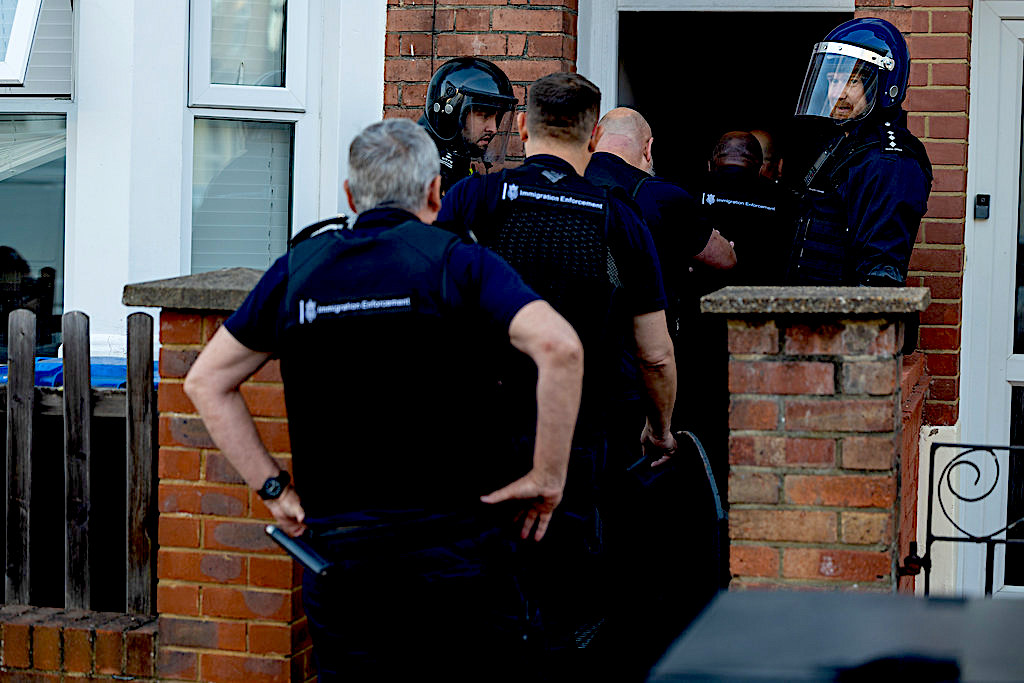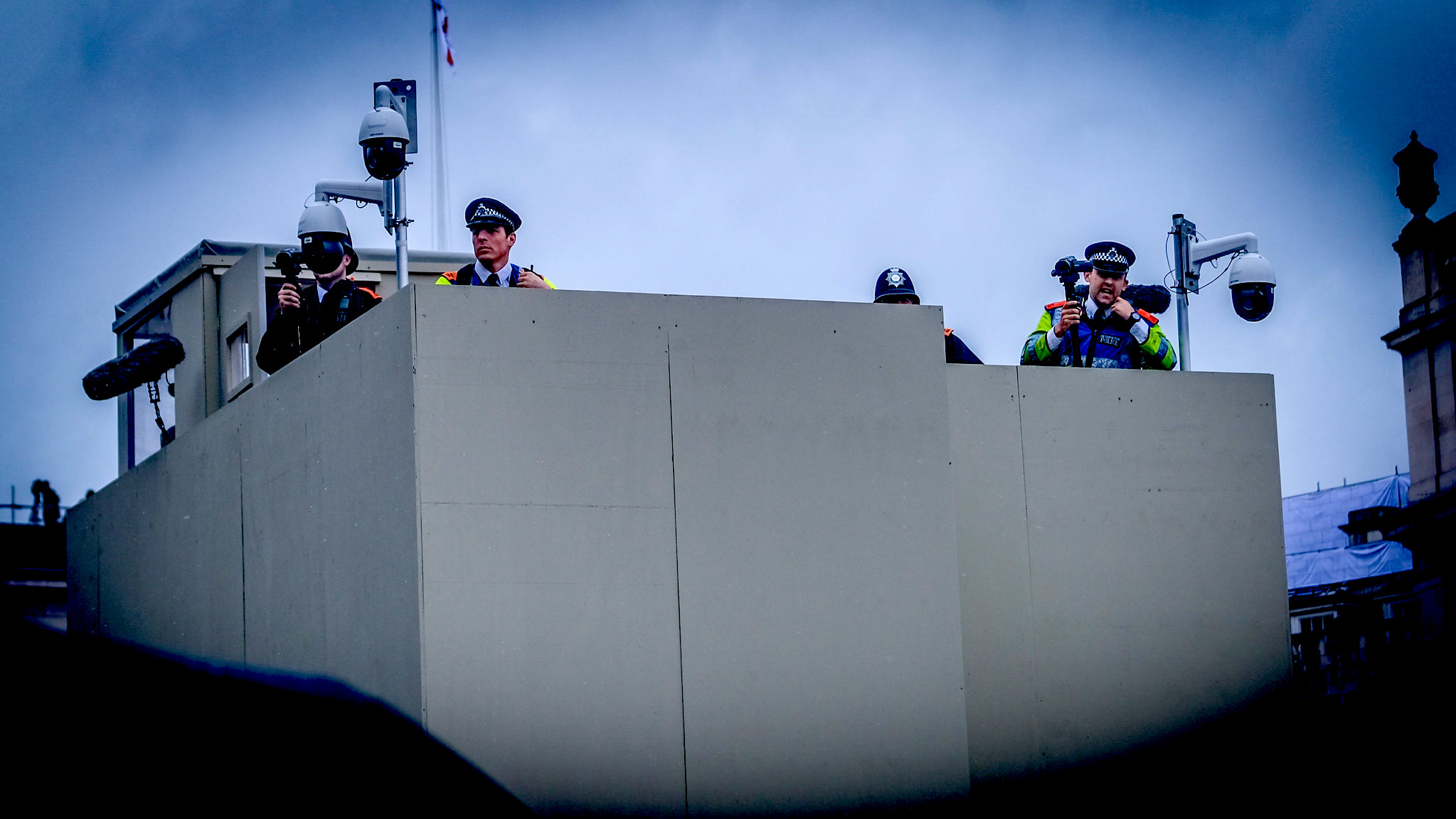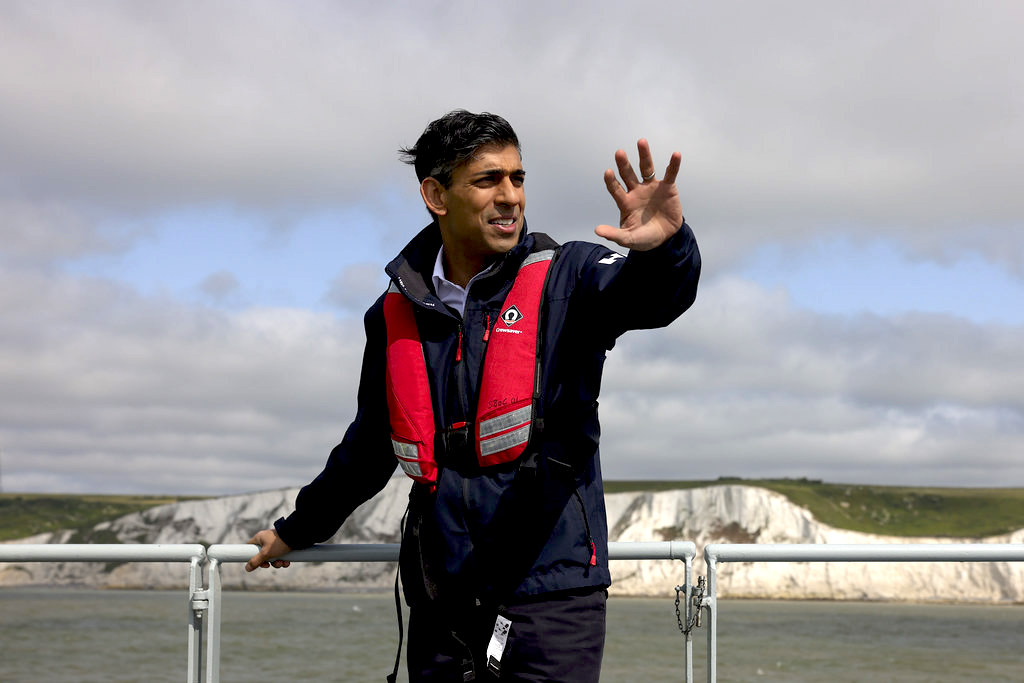There is no culture war over immigration in the normally understood sense, writes Arun Kundnani. Rather, there is a strange and hidden class war being fought out on the terrains of race and culture.

A U.K. Home Office Immigration Enforcement Office immigration intelligence-led visit in north west London, observed by Prime Minister Rishi Sunak on June 15. (Simon Walker / No 10 Downing Street)
By Arun Kundnani
openDemocracy
 Government ministers warned of an influx of migrants overwhelming public services. Newspaper headlines declared war on imagined armies of welfare cheats invading Britain through easily penetrated borders.
Government ministers warned of an influx of migrants overwhelming public services. Newspaper headlines declared war on imagined armies of welfare cheats invading Britain through easily penetrated borders.
Plans to build accommodation centres for asylum seekers were abandoned in the face of local hostility. The year was 2001, but the level of publicly expressed animosity towards migrants and asylum seekers was much like that of 2023.
Along with other activists, I travelled around Britain that summer as part of what we called a Civil Rights Caravan, aiming to counter the country’s latest anti-immigrant turn.
On the Sighthill housing estate in Glasgow, tensions were especially high. A fifth of its 6,000 residents were asylum seekers, relocated there by a government “dispersal” programme that sought to move them away from more expensive locations in London.
With regular acts of racist violence perpetrated against them, asylum seekers were fearful of venturing out of their homes. Then, on a hot night in August, a local man, Scott Burrell, set upon Firsat Dag, a Kurdish refugee from Turkey living on the estate. Dag was chased and stabbed to death.
But local activists also recounted another story that, to them, held important lessons on how positive change can be brought about.
They spoke about one of the young white men living on Sightill who was among those who regularly harassed the asylum seeker residents. Living in poverty and struggling to find work, he was irate that people from Africa, Asia and the Middle East could turn up, get housed, and be provided for — no matter how paltry that provision actually was.
He was powerless to change the way the system worked but, at least on Sighthill, he and his friends held another kind of power — the ability to inflict violence on darker-skinned newcomers.
One day, he was walking across the estate and came across an asylum seeker sitting on a bench. In the activists’ account, he launched into his usual tirade of abuse: “You’re a scrounger! Go and get a job!” Fists formed, ready to punctuate these injunctions with punches.
The asylum seeker seemed to have his hands in his pockets. But then he lifted his arms to reveal that both of his hands had been chopped off. “This is why I can’t work,” he said. “This is what the police in Turkey did to me.”
Suddenly a connection sparked between abuser and abused.
Police violence was familiar to every white person on the estate, not an aspect of a strange foreign culture needing to be understood through some multicultural awareness initiative. The shared experiences of police brutality made possible a bond.
This was the moment that a perpetrator of racist violence began to change. The young white man soon became an advocate for the rights of asylum seekers. According to local activists, this was the pivotal moment when harassment on the estate began to decline.

Police Surveillance of The Rascal Multitude — during the coronation protests in London, May 6. (Alisdare Hickson, Flickr, CC BY-SA 2.0)
As with any story that is passed on orally, its accuracy is hard to verify. Its significance, though, is that it offers a different way of thinking about how to confront reactionary opinions on immigration.
Unlike in the usual liberal defence, there was no celebration of the cultural differences immigration brings or highlighting the economic contributions of migrants. Instead, a transformation occurred through locals and migrants identifying on the basis of a shared grievance.
They recognised in each other a common experience of having been discarded by society, forced to eke out the barest of lives on government handouts and seen as degenerate and dangerous by the agents of state violence. Even if the people I spoke to did not explicitly put it in those terms, what connected them was a sense of class struggle.
Calling it Culture War
Well-meaning liberals typically assume that the barrier to more progressive immigration policies is the nationalist values of the working class. They share with conservatives the view that political contestation on immigration is a culture war between pro-immigration liberal elites and anti-immigration working-class nationalists — seen as two political tribes with fixed and antagonistic values.
While there is some basis for this division in polling, as an analysis of what shapes the politics of immigration this interpretation is doubly wrong. It not only caricatures working-class nationalism but misses how the wealthy uphold the cruelties of the immigration system.

U.K.Prime Minister Rishi Sunak visits a Border Force cutter boat in the Dover Strait on June 5. (Simon Dawson / No 10 Downing Street)
Liberals who accept the culture war interpretation see themselves as virtuous opponents of lower-class prejudice, preaching the value of cultural diversity and the economic benefits of migration.
But their celebration of other cultures is presented in terms of widening consumer choices: what a wonderful range of foods is now available in our shops and restaurants! This is of little value to those struggling to get by.
The argument that migration brings economic benefits is equally liable to miss the point. Liberals talk about positive correlations between increased immigration and overall growth in the economy. And they point out that new workers entering the country from elsewhere rarely compete for the same jobs as the existing population, so there is no reason to expect immigration to bring declines in wages.
But growth in the economy as a whole does not carry through to improving standards of living for poor people, unless organised labour has political clout.
When pro-immigration liberals ignore these issues, their celebration of diversity can easily come across as the enforced values of an economic system in which working-class people have lost out. Neoliberal globalisation has gone hand in hand with a decline in the power of organised labour.
From a class point of view, the real question is how patterns of migration link to the collective bargaining power of workers. There is no denying that sometimes employers use migrant workers to try to weaken that power.
Equally, there are other situations in which migrant workers revitalise a native labour movement by importing new modes of organisation and fresh political thinking. Yet pro-immigration campaigners rarely engage on this more pertinent level.
Border Lines

Friedrich Hayek, undated. (Released by the Mises Institute, Wikimedia Commons, CC BY-SA 3.0)
And for all their vaunted cosmopolitanism, neoliberal elites do not want a borderless world.
The most important neoliberal intellectuals of the 20th century believed in using border controls to prevent the entry into Europe of people seen as having different cultures.
Friedrich Hayek, the economist who set out neoliberalism’s free-market principles, for example, might have been expected to support the free movement of people from one nation to another.
But actually, he put these principles aside when it came to immigration, arguing that European governments should stop people coming who do not share with the West a “common system of basic moral beliefs.”
In this century, wealthy self-styled liberals living in the English shires have regularly mobilised to keep asylum seekers out of their communities. In the early 2000s, for example, there was a wave of mass protests against plans for asylum seeker accommodation centres in Kent, Sussex, Oxfordshire, Hampshire, Dorset and Lincolnshire.
A local campaign against plans to build an accommodation centre near Pershore, Worcestershire, reportedly won support from fashion designer Stella McCartney, who had a £1.3m farmhouse in the village, and “Songs of Praise” presenter Toyah Wilcox. The Home Office cancelled its plans after hundreds demonstrated at the proposed site.
The neoliberal think tanks and the wealthy who gather at Davos are also at best divided on the extent to which immigration is desirable. The billionaire Koch brothers, for example — the world’s largest funders of neoliberal activism — have lavishly funded both pro-immigrant and anti-immigrant think tanks in the US. The belief, held by many on the left, that neoliberals “are completely for open borders” is mistaken.
Borders are profitable to capitalists for two reasons. They block the overwhelming majority of super-exploited workers in the Global South from moving north to obtain higher wages, and they create migrant workforces in the North that are highly policed and easily deportable – the better to exploit them.
“Pro-immigration” neoliberal think tanks are as committed to the infrastructures of border enforcement as those that oppose immigration — all of them are responsible for the seas of misery that borders produce.
No wonder that neoliberal politicians so often declare their pride in a Britain that is “open, diverse and welcoming” (if only!) but then, in the next breath, claim that, reluctantly, nationalist sentiments must be honoured in policy-making as “genuine concerns.”
How convenient that working-class nationalists provide an alibi for policies that our neoliberal leaders would choose to pursue anyway.
There is no culture war over immigration in the normally understood sense. Rather, there is a strange and hidden class war being fought out on the terrains of race and culture. At stake is the very definition of the working class: whether or not it can extend to a political refugee from Turkey — or anyone else from the Global South.
To win that class war requires understanding that working-class anti-immigrant sentiment is lodged in a misdirected sense of class interest, and it needs to be dislodged on those terms, rather than through appeals to cosmopolitanism or empty promises of economic betterment.
And it means grasping that, in this war, the flags waved can be misleading: the neoliberals who preach cultural tolerance to the less wealthy are those most responsible for the death-by-policy we inflict on migrants and asylum seekers.
Arun Kundnani’s latest book, What is Antiracism? And Why it Means Anticapitalism, is published this month by Verso. He is also the author of The End of Tolerance (Pluto Press) and The Muslims are Coming! Islamophobia, extremism, and the domestic war on terror ’ (Verso). He tweets at @ArunKundnani
This article is from openDemocracy.
The views expressed are solely those of the author and may or may not reflect those of Consortium News.


From a British working class perspective, I’m constantly amazed that anyone wants to come here at all, given that we seem set on a course of neo-liberal self-destruction, including all the human rights that refugees think they’ll find here.
Then I think back a few years, when there was a burst of media-driven hysteria about the refugee camps in Calais, France. BBC Radio 4 interviewed an African would-be immigrant as to why he wanted to get to Britain, legally or illeagally.
He replied that if he could get to Britain he’d be given a house, a job and money. Like it was some sort of inititive test, and that’d be the prize if he could get to the UK.
My first thought was : Dream on, you poor deluded sap.”
My second thought was : “That sounds very familiar.”
Then I realised that he was repeating the lies constantly broadcast by right wing groups and most of the British MSM – “they’re coming over here, they get given houses and money, get given anything they want.”
All rubbish of course, but its been parrotted so often that many Brits believe its true – especially if they WANT it to be true.
It seems to me that these lies have also found their way to would-be immigrants, many of whom who don’t realise that they are propaganda directed against them, not a promise of a new life in the Land of Milk & Honey.
By constantly lieing about the fate of immigrants to the UK, it seems that those doing so have inadvertantly encouraged them to try their luck. You could almost laugh, if it wasn’t so sad.
If the MSM were to be truthful about where this country is heading – and immigrants’ likely future role as scapegoats – maybe most would reasses their options. But the day the MSM reports news truthfully rather than manipulating it is the day Hell freezes over.
And of course there’s the eternal bottom line : “If you want fewer refugees and asylum seekers, stop doing the things that create them in the first place.”
Well said Red Star. That is the whole truth of it.
It has been reported that ~2,000 migrants made their way across the English Channel illegally just last weekend alone.
They are coming to a country where a deliberate shortage of social housing is seeing adults living at home with their parents well into their 20/30s as they cannot afford to get on the housing ladder.
The current bill for housing migrants (most are not from war torn countries e.g, India, Bangladesh, Albania, Iran although many are ) is upward of £5m a day so over £1bn annually. Where are we going to house a these largely unskilled and illiterate people and what is the long term plan?
How are the current overstretched & underfunded public services going to cope with this never ending influx?
A city with the population of ~300k is being added to the UK population every year, it’s clearly unsustainable and it’s wrong but nothing is being done about it. Sadly, this is all by design.
What happened to the concept of controlled immigration and border control? I’m all for migration if we have skill shortages in certain sectors.
This is a tiny, cramped Island.
There is no common sense anymore.
Time to stop the endless debates, time for real action. The UK is a dysfunctional, broken country, Thanks mainly to decades of corrupt government. This uncontrolled, mass invasion by immigrants and refugees is a symptom of its incompetence and will ultimately lead to deaths.
Italy, Spain, Greece are experiencing the same refugee crisis. It’s a never-ending phenomenon. Remember the Vietnamese boat people.
While i believe that neoliberalism, neocolonialism, and uncontrolled capitalism are the main causes for most the evils of this world, i also believe that wokes like the author of this article, who get everything wrong and make everything worse as a result, are also an important source for the evils that plague this world.
Would also like to express my concern over the fact that Consortium News is giving a platform to woke voices.
In my opinion, allowing woke opinions is no different from allowing hard right opinions. Consortium news should stay away from these two opposite poles.
Utter nonsense. I don’t see what’s “woke” in the author’s article. One of the side-effects of critical theory is hard-right troublemakers running around screaming “woke” at anything that “offends” them.
You don’t see what is woke in the article? Let me give you a few hints.
First he is for open borders and thus for the abolition of the nation state, and thus for creolisation. Those are hard line progressive (woke) concepts.
He is for unlimited immigration and sees migrants and asylum seekers as victims of the government’s “death by policy”, and that is another woke claim which is also completely false as most woke claims.
Not here to make a detailed analysis of this article, but it is full of implicit and explicit wokeness.
Here’s an interesting article on “woke” and its origins and connotations:
hxxps://www.poynter.org/fact-checking/2023/what-does-woke-mean-definition/
From the above mentioned article:
“British lexicographer and linguist Tony Thorne said he construes “woke” to mean “alert to and aware of issues of social justice.” Since the 2000s, he told PolitiFact, it’s meant something like “an activist for or militant supporter of equality, diversity, social justice.””
Yes Valerie, but unfortunately the meaning of words change with use, and it happens very rapidly in this day and age.
Woke is used most often to describe a person that takes “equality diversity and inclusion” too far. When i say too far, i mean beyond the boundaries of common sense, and making statements that are visibly false, like generalized or systemic racism, or like the ones from this very article claiming “death by policy” inflicted on migrants and asylum seekers, or the “the seas of misery that borders produce.”
Yes kaboro. I get your point. And the MSM most probably has a hand in promoting such extreme ideas.
A good article but it is also necessary to point out that the West has made life unlivable for many people due to their constant wars — never fought in their own countries — their constant theft of resources, their insistence on shoving their cheap agricultural goods down other people’s throats (see the U.S. in relation to Central and South America), their unbelievable interference in other nations’ internal affairs, on and on.
I may have read this too fast but I think it ignores what creates concern–a world population level that is now unsustainable, and those countries now absorbing high numbers of people already have ecosystems straining under duress along with polluted waterways.
There is not a problem that isn’t exacerbated by the population footprint.